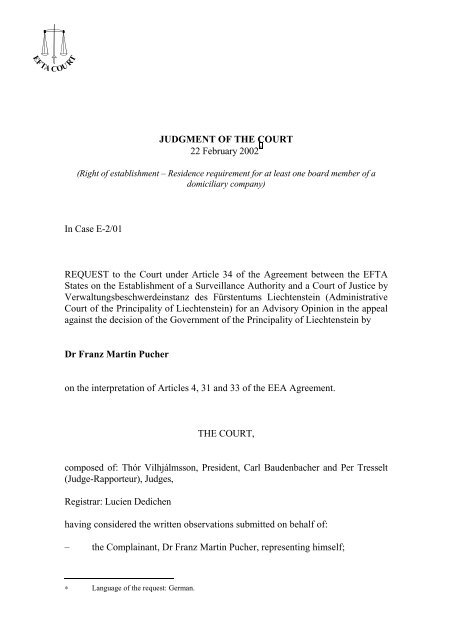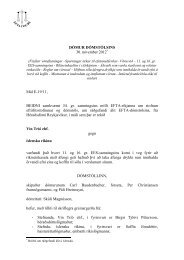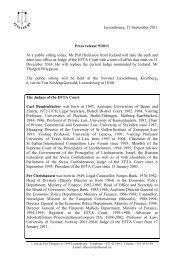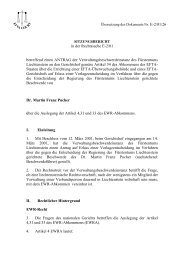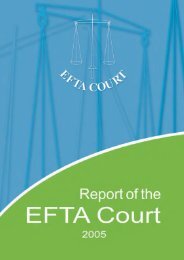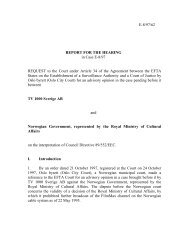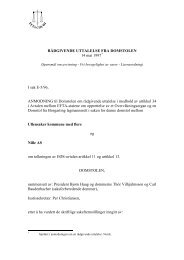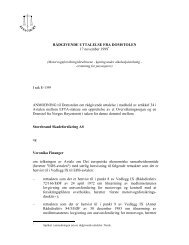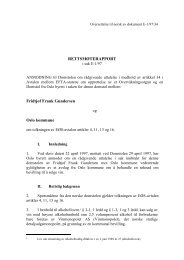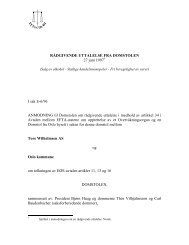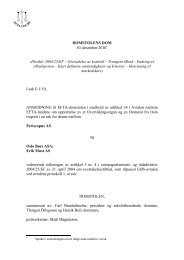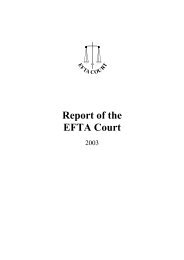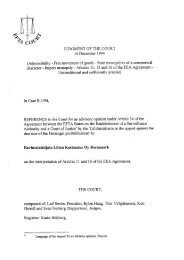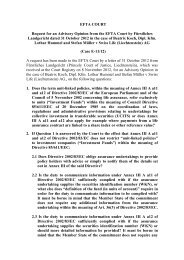Judgment E-2/01 - EFTA Court
Judgment E-2/01 - EFTA Court
Judgment E-2/01 - EFTA Court
Create successful ePaper yourself
Turn your PDF publications into a flip-book with our unique Google optimized e-Paper software.
JUDGMENT OF THE COURT<br />
22 February 2002 ∗<br />
(Right of establishment – Residence requirement for at least one board member of a<br />
domiciliary company)<br />
In Case E-2/<strong>01</strong><br />
REQUEST to the <strong>Court</strong> under Article 34 of the Agreement between the <strong>EFTA</strong><br />
States on the Establishment of a Surveillance Authority and a <strong>Court</strong> of Justice by<br />
Verwaltungsbeschwerdeinstanz des Fürstentums Liechtenstein (Administrative<br />
<strong>Court</strong> of the Principality of Liechtenstein) for an Advisory Opinion in the appeal<br />
against the decision of the Government of the Principality of Liechtenstein by<br />
Dr Franz Martin Pucher<br />
on the interpretation of Articles 4, 31 and 33 of the EEA Agreement.<br />
THE COURT,<br />
composed of: Thór Vilhjálmsson, President, Carl Baudenbacher and Per Tresselt<br />
(Judge-Rapporteur), Judges,<br />
Registrar: Lucien Dedichen<br />
having considered the written observations submitted on behalf of:<br />
– the Complainant, Dr Franz Martin Pucher, representing himself;<br />
∗ Language of the request: German.
- 2 -<br />
– the Government of Liechtenstein, represented by Beatrice Hilti, Deputy<br />
Director, EEA Coordination Unit;<br />
– the Government of Iceland, represented by Anna Jóhannsdóttir, Legal<br />
Officer, Ministry of Foreign Affairs, acting as Agent;<br />
– the Government of Norway, represented by Helge Seland, Assistant<br />
Director General, Ministry of Foreign Affairs, acting as Agent;<br />
– the <strong>EFTA</strong> Surveillance Authority, represented by Michael Sánchez<br />
Rydelski and Elisabethann Wright, Officers, Legal & Executive Affairs,<br />
acting as Agents;<br />
– the Commission of the European Communities, represented by John<br />
Forman and Maria Patakia, Legal Advisers, Legal Service, acting as<br />
Agents.<br />
having regard to the Report for the Hearing,<br />
having heard the oral arguments of the Complainant, Dr Franz Martin Pucher, the<br />
Government of Liechtenstein, represented by Christoph Büchel, the <strong>EFTA</strong><br />
Surveillance Authority and the Commission of the European Communities at the<br />
hearing on 16 November 20<strong>01</strong>,<br />
gives the following<br />
I Facts and procedure<br />
<strong>Judgment</strong><br />
1 By an order dated 12 March 20<strong>01</strong>, registered at the <strong>Court</strong> on 14 March 20<strong>01</strong>, the<br />
Verwaltungsbeschwerdeinstanz des Fürstentums Liechtenstein made a Request<br />
for an Advisory Opinion in the appeal against the decision of the Government of<br />
the Principality of Liechtenstein by Dr Franz Martin Pucher (hereinafter, the<br />
“Complainant”).<br />
2 The Complainant is an Austrian national residing in Feldkirch, Austria. He is<br />
admitted to practise in Liechtenstein as a professional trustee; and is the manager<br />
of a Liechtenstein trust company with its seat in Liechtenstein. His application<br />
for a permanent residence permit in Liechtenstein was refused by Liechtenstein<br />
authorities in accordance with the EEA Joint Committee Decision 191/1999<br />
Amending Annexes VIII (Right of establishment) and V (Free movement of<br />
workers) to the EEA Agreement (OJ 20<strong>01</strong> L 74, p. 29).<br />
3 On 29 September 1999, the Complainant applied to the Liechtenstein Amt für<br />
Finanzdienstleistungen (Financial Services Office) for an authorisation to serve
- 3 -<br />
as the qualified member of the board of directors of a domiciliary company, as<br />
referred to in Article 180a of the Personen- und Gesellschaftsrecht (Act on<br />
Persons and Companies) of 20 January 1926, as amended (hereinafter, the<br />
“Persons and Companies Act”). The Amt für Finanzdienstleistungen refused to<br />
grant the authorisation applied for, essentially on the grounds that the<br />
Complainant, at that time, was residing in Austria, and therefore, did not fulfil<br />
the requirement of permanent residence in Liechtenstein, as set out in Article<br />
180a of the Persons and Companies Act.<br />
4 The Complainant lodged a complaint with the Government of Liechtenstein,<br />
requesting that the decision of the Amt für Finanzdienstleistungen be rescinded<br />
and the authorisation be granted. The Government of Liechtenstein dismissed the<br />
complaint by a decision of 19 September 2000.<br />
5 The Complainant filed an appeal against that decision with the<br />
Verwaltungsbeschwerdeinstanz des Fürstentums Liechtenstein (Administrative<br />
<strong>Court</strong> of the Principality of Liechtenstein). In the proceedings pending before the<br />
Verwaltungsbeschwerdeinstanz, the Complainant has raised issues concerning<br />
the compatibility of the residence requirement in Article 180a of the Persons and<br />
Companies Act with the EEA Agreement.<br />
6 The Verwaltungsbeschwerdeinstanz decided to request an Advisory Opinion<br />
from the <strong>EFTA</strong> <strong>Court</strong> on the following questions:<br />
1. Does the residence requirement imposed by Article 180a(1) of the<br />
Persons and Companies Act constitute overt or covert discrimination on<br />
grounds of nationality within the meaning of Article 4 EEA, alternatively,<br />
does that residence requirement constitute a restriction on the freedom of<br />
establishment provided for by Article 31 EEA?<br />
2. If the answer to question 1 is in the affirmative: is the discrimination or<br />
restriction justified on public-interest grounds, in particular those of<br />
public policy and/or public security (see Article 33 EEA)?<br />
7 Reference is made to the Report for the Hearing for a detailed account of the<br />
facts, the procedure and the written observations submitted to the <strong>Court</strong>, which<br />
are mentioned or discussed hereinafter only in so far as is necessary for the<br />
reasoning of the <strong>Court</strong>.<br />
II Legal background<br />
EEA law<br />
8 The questions submitted by the national court concern the interpretation of<br />
Articles 4, 31 and 33 EEA.
9 Article 4 EEA reads as follows:<br />
- 4 -<br />
“Within the scope of application of this Agreement, and without prejudice to any<br />
special provisions contained therein, any discrimination on grounds of nationality shall<br />
be prohibited.”<br />
10 Article 31 EEA reads as follows:<br />
“1. Within the framework of the provisions of this Agreement, there shall be no<br />
restrictions on the freedom of establishment of nationals of an EC Member State or an<br />
<strong>EFTA</strong> State in the territory of any other of these States. This shall also apply to the<br />
setting up of agencies, branches or subsidiaries by nationals of any EC Member State or<br />
<strong>EFTA</strong> State established in the territory of any of these States.<br />
Freedom of establishment shall include the right to take up and pursue activities as selfemployed<br />
persons and to set up and manage undertakings, in particular companies or<br />
firms within the meaning of Article 34, second paragraph, under the conditions laid<br />
down for its own nationals by the law of the country where such establishment is<br />
effected, subject to the provisions of Chapter 4.<br />
2. Annexes VIII to XI contain specific provisions on the right of establishment.”<br />
11 Article 33 EEA reads as follows:<br />
“The provisions of this Chapter and measures taken in pursuance thereof shall not<br />
prejudice the applicability of provisions laid down by law, regulation or administrative<br />
action providing for special treatment for foreign nationals on grounds of public policy,<br />
public security or public health.”<br />
National law<br />
12 Article 180a of the Persons and Companies Act reads as follows:<br />
“1. At least one board member of a legal entity, having authority to manage and<br />
represent the same, must be a national of an EEA State permanently residing in<br />
Liechtenstein and admitted to practise in Liechtenstein as a lawyer (Rechtsanwalt), legal<br />
agent (Rechtsagent), professional trustee (Treuhänder) or auditor (Wirtschaftsprüfer).<br />
2. The same status shall be deemed to be held by persons residing in Liechtenstein who<br />
possess evidence of educational and/or training qualifications corresponding to the<br />
requirements laid down in paragraph (1) and recognised by the Government pursuant to<br />
statute or international treaty, whose fixed, main employment is with a lawyer, legal<br />
agent, professional trustee, accountant, trust company, firm of auditors or bank and who<br />
pursue their activities in such employment within the meaning of paragraph (1). Aliens<br />
who are not nationals of an EEA State shall be required to possess a permit allowing<br />
them to settle in Liechtenstein.<br />
3. The obligation imposed in paragraph (1) shall not apply to legal entities which are<br />
required under the Gewerbegesetz (Law on Trades and Businesses) or some other<br />
special statute to have a qualified business manager.”
- 5 -<br />
13 The member of the board of directors of a legal entity who fulfils the<br />
requirements in Article 180a(1) is often referred to as the qualified board member<br />
of that entity.<br />
14 The Persons and Companies Act differentiates between two different types of<br />
companies incorporated under Liechtenstein law, namely Liechtenstein<br />
companies not carrying out business in Liechtenstein (domiciliary companies)<br />
and Liechtenstein companies doing business in Liechtenstein (active companies).<br />
Only the qualified board member of the former is subject to the residence<br />
requirement in Article 180a.<br />
III Findings of the <strong>Court</strong><br />
The first question<br />
15 By its first question, the national court essentially seeks to ascertain whether a<br />
requirement in the national law of an EEA State that at least one member of the<br />
board of directors of a domiciliary company, having authority to manage and<br />
represent that company, must be permanently residing in that State, constitutes<br />
discrimination within the meaning of Article 4 EEA, or a restriction on the<br />
freedom of establishment within the meaning of Article 31 EEA.<br />
16 Article 31 EEA, which the <strong>Court</strong> finds must be examined first, provides for the<br />
abolition of all restrictions on establishment between the EEA States. The<br />
freedom of establishment includes, inter alia, the right of nationals of the EEA<br />
States to take up and pursue activities as self-employed persons and to set up and<br />
manage undertakings under the same conditions as are laid down by the law of<br />
the EEA State of establishment with respect to its own nationals.<br />
17 The contested residence requirement is formulated in general terms, and does not<br />
distinguish between Liechtenstein nationals and nationals of other EEA States. It<br />
applies to all domiciliary companies incorporated under Liechtenstein law, and to<br />
all EEA nationals admitted to practise one of the professions required to serve as<br />
the qualified board member, viz. a lawyer, legal agent, professional trustee, or<br />
auditor. There is no overt discrimination in this respect.<br />
18 However, it is settled case-law that the rules of equal treatment prohibit not only<br />
overt discrimination based on nationality but also all covert forms of<br />
discrimination which, by applying other distinguishing criteria, achieve in<br />
practice the same result (see Case E-3/98 Rainford Towning [1998] <strong>EFTA</strong> <strong>Court</strong><br />
Report 205, at paragraph 27).<br />
19 The <strong>EFTA</strong> <strong>Court</strong> and the <strong>Court</strong> of Justice of the European Communities have<br />
consistently held that national rules under which a distinction is drawn on the<br />
basis of residence are liable to operate mainly to the detriment of nationals of
- 6 -<br />
other EEA States, as non-residents are in the majority of cases foreigners (see<br />
Rainford-Towning, cited above, at paragraph 29 and Case C-279/93 Schumacker<br />
[1995] ECR I-225, at paragraph 28).<br />
20 On that basis, the <strong>Court</strong> found in Rainford-Towning, cited above, at paragraph<br />
30, that a requirement that a national of another EEA State must reside in the<br />
State concerned in order to be appointed managing director of a active company<br />
exercising trade, constitutes indirect discrimination contrary to Article 31 EEA.<br />
The residence requirement at issue in the present case requires one, unspecified,<br />
board member of a domiciliary company, having authority to manage and<br />
represent that company, to be permanently residing in Liechtenstein. No<br />
restrictions with regard to residence are placed on other members of the board.<br />
21 However, the residence requirement for the qualified board member of a<br />
domiciliary companies has the corresponding effect of placing nationals of other<br />
EEA States engaged in the specified professions at a disadvantage compared with<br />
Liechtenstein nationals engaged in those professions.<br />
22 The <strong>Court</strong> notes from the information presented to it, that an important part of the<br />
profession of trustees in Liechtenstein is their engagement in the administration<br />
of Liechtenstein companies, in particular as a board member. Lawyers, legal<br />
agents, professional trustees and auditors practising their professions in<br />
Liechtenstein, and having their permanent residence in another State, may not<br />
function as the qualified board member of a domiciliary company, and in that<br />
respect, the residence requirement constitutes a restriction on the ability to act as<br />
a trustee. That restriction appears more likely to be of consequence for nationals<br />
of other EEA States than for Liechtenstein nationals.<br />
23 Furthermore, the <strong>Court</strong> considers that, in addition to the abovementioned<br />
restrictions on the exercise of the specified professions, the contested residence<br />
requirement may also entail certain restrictions on nationals of other EEA States<br />
seeking to set up and manage a domiciliary company in Liechtenstein.<br />
24 It must therefore be concluded that a residence requirement such as the one at<br />
issue in the main proceedings, constitutes indirect discrimination contrary to<br />
Article 31 EEA.<br />
25 That being so, it is not necessary to examine whether a national provision such as<br />
that contested in the main proceedings, is contrary to the general prohibition of<br />
discrimination on grounds of nationality set out in Article 4 EEA; as that<br />
provision applies independently, only to situations governed by EEA law for<br />
which the EEA Agreement lays down no specific rules prohibiting discrimination<br />
(see Case E-1/00 Íslandsbanki-FBA, judgment of 14 July 2000, not yet reported,<br />
at paragraphs 35 and 36).<br />
26 The answer to the first question must therefore be that a national provision such<br />
as that at issue in the main proceedings, requiring that at least one member of the<br />
board of directors of a domiciliary company, having authority to manage and
- 7 -<br />
represent same, must be permanently residing in that State, constitutes a<br />
restriction on the freedom of establishment within the meaning of Article 31<br />
EEA.<br />
The second question<br />
27 By its second question, the national court asks whether the residence requirement<br />
at issue may be justified under Article 33 EEA on grounds of public interest, in<br />
particular those of public policy and/or public security.<br />
28 The Government of Liechtenstein has argued that the contested residence<br />
requirement is objectively justified under Article 33 EEA, and therefore, not<br />
contrary to the freedom of establishment provided for in Article 31 EEA.<br />
According to the Government of Liechtenstein, the over-all public policy<br />
objective pursued is the maintenance of the functioning and good reputation of<br />
the Liechtenstein financial services sector. That sector is based inter alia on the<br />
liberal rules of the Persons and Companies Act with regard to the incorporation<br />
of domiciliary companies. By requiring the qualified board member to be<br />
permanently residing in Liechtenstein, the prevention of abuses of those liberal<br />
rules is facilitated. The Government of Liechtenstein has argued that the greater<br />
likelihood of the board member being present in Liechtenstein, ascribed to the<br />
residence requirement, will assist the administration of justice, simplify the<br />
execution of civil law judgments, and facilitate the enforcement of administrative<br />
and criminal sanctions.<br />
29 In view of the rejection by the <strong>Court</strong> of similar arguments put forward in<br />
Rainford-Towning, cited above, the Government of Liechtenstein submits that<br />
there are relevant differences between the situation underlying that case and the<br />
present case. The former case concerned active companies, whereas the instant<br />
case relates exclusively to domiciliary companies. Due to the liberal rules of the<br />
Liechtenstein company law, domiciliary companies are particularly susceptible to<br />
abuses, and require more stringent control.<br />
30 As a preliminary point, the <strong>Court</strong> notes that there is, in principle, nothing in the<br />
EEA Agreement that prevents Liechtenstein from maintaining a liberal company<br />
law system. However, that system must operate within the limits of EEA law. It<br />
must be organised to function so as not to conflict with the rules of the EEA<br />
Agreement on the freedom of establishment, including Articles 31 and 33 EEA.<br />
31 Article 33 EEA provides for derogation from the fundamental principle of<br />
freedom of establishment. Its application must therefore be strictly interpreted. In<br />
order to fall within the scope of Article 33 EEA, and thereby escape the<br />
application of Article 31 EEA, the contested residence requirement must fulfil<br />
the following conditions: it must pursue an objective of public interest as<br />
provided for in Article 33 EEA; it must be appropriate for securing the<br />
attainment of the objective pursued; and it must be objectively necessary and
- 8 -<br />
proportionate to that objective (see, Case 352/85 Bond van Adverteerders v<br />
Netherlands State [1988] ECR 2085, at paragraphs 33 and 36).<br />
32 The <strong>Court</strong> acknowledges that protecting the functioning and good reputation of<br />
the financial services sector is a legitimate public policy objective (see, Case C-<br />
384/93 Alpine Investments [1995] ECR I-1141, at paragraph 44). The <strong>Court</strong> also<br />
acknowledges that securing compliance with national legislation, assisting the<br />
administration of justice, facilitating the execution of civil judgments, and<br />
enforcing administrative and criminal sanctions are important elements in order<br />
to achieve that objective. The <strong>Court</strong> has noted the argument that domiciliary<br />
companies may require other control measures than active companies. However,<br />
there is nothing in the information presented to the <strong>Court</strong> that supports the<br />
finding that the residence requirement for a qualified board member of a<br />
domiciliary company is a suitable and necessary measure to attain those<br />
objectives. There seem to be less restrictive and more appropriate means to<br />
achieve those goals.<br />
33 In the view of the <strong>Court</strong>, the residence requirement is neither suitable nor<br />
necessary to ensure the compliance with national legislation by a company or a<br />
board member, or for the effective control of such compliance by the public<br />
authorities. The realisation of those objectives would not appear to be dependent<br />
on the physical presence or the place of residence of the board member. Similar<br />
observations were made in Rainford-Towning, cited above, at paragraph 34.<br />
Based on the information before it, the <strong>Court</strong> considers that the findings with<br />
regard to a managing director of active companies in that case are equally valid<br />
with regard to a qualified board member of domiciliary companies in the present<br />
case.<br />
34 Even absent the contested residence requirement, the governing provision would<br />
continue to set strict standards for the representation of a domiciliary company in<br />
its relations with the Liechtenstein authorities. Only members of certain<br />
professions having been admitted to practise their profession in Liechtenstein, are<br />
eligible. The provision presupposes that a person so designated have broad<br />
powers. The professional qualifications of any such person will have been<br />
scrutinized by Liechtenstein authorities in connection with the initial admission<br />
to practise. The trust placed in those persons, both by the owners of a company<br />
and by the Liechtenstein authorities, requires them to carry out their duties with a<br />
high degree of professional competence and integrity. If this trust is abused, the<br />
Liechtenstein authorities will presumably have the possibility to take corrective<br />
measures.<br />
35 In particular, as regards the control by public authorities, the <strong>Court</strong> notes that<br />
while, on the one hand, the physical presence or residence in Liechtenstein of a<br />
board member does not guarantee that public authorities are provided with the<br />
information they require, it is, on the other hand, possible for a board member to<br />
provide all necessary information without being physically present or resident<br />
there. More appropriate and less restrictive means of monitoring and controlling<br />
of the activities of domiciliary companies could, for example, comprise periodic
- 9 -<br />
reporting requirements, or an obligation to make available specified and relevant<br />
information at the registered office of the company.<br />
36 For these reasons, the <strong>Court</strong> finds that considerations relating to the compliance<br />
with national legislation and the effective control of such compliance cannot be<br />
held to justify the imposition of a residence requirement in derogation of Article<br />
31 EEA.<br />
37 Furthermore, the <strong>Court</strong> considers that the residence requirement is neither<br />
suitable nor necessary to assist the administration of justice, ensure the execution<br />
of civil judgments or enforce administrative and criminal sanctions. In Rainford-<br />
Towning, cited above, at paragraph 35, the <strong>Court</strong> rejected the argument that the<br />
residence requirement was necessary to enforce criminal sanctions against a<br />
managing director of an active company. The <strong>Court</strong> considers that finding also to<br />
be applicable to a qualified board member of a domiciliary company.<br />
38 As regards the formal aspects of the administration of justice, the <strong>Court</strong> notes that<br />
legislation could be enacted to ensure that any claim or writ instituting<br />
proceedings in civil or administrative matters, or any charge or indictment in<br />
criminal matters may be served at the registered office of a company.<br />
39 As regards the execution of civil law judgments, the <strong>Court</strong> acknowledges that<br />
certain complications may arise since Liechtenstein is not party to the Lugano<br />
Convention of 16 September 1988 on jurisdiction and the enforcement of<br />
judgments in civil and commercial matters (OJ 1988 L 319, p. 9). The <strong>Court</strong><br />
observes that, if such complications were of vital concern in relation to the public<br />
policy objective pursued, accession to this instrument would constitute one<br />
remedy. Moreover, the <strong>Court</strong> recognizes that litigation or execution in foreign<br />
jurisdictions often involves costs and complications that will not arise in the<br />
domestic jurisdiction. However, the encouragement of cross-border activity is a<br />
fundamental objective of the EEA Agreement; and, whenever such activity gives<br />
rise to litigation, the enforcement of judgments must often be sought within the<br />
jurisdiction of another EEA State. The situation with regard to claims relating to<br />
the operations of domiciliary companies in Liechtenstein is therefore not<br />
exceptional.<br />
40 Likewise, a residence requirement does not in itself ensure that the qualified<br />
board member of a domiciliary company will be present for any civil proceedings<br />
instituted against him, or that his means, or those of the company, will be<br />
adequate to satisfy a judgment against him or the company.<br />
41 For these reasons, the <strong>Court</strong> finds that considerations relating to the<br />
administration of justice in civil matters cannot be held to justify the imposition<br />
of a residence requirement in derogation of Article 31 EEA.<br />
42 As regards the enforcement of administrative and criminal sanctions, the <strong>Court</strong><br />
considers that there are other, less restrictive means of attaining that objective.<br />
Notice of fines may be served at the registered office of the company. The
- 10 -<br />
payment of such fines may be ensured by requiring that the company or the board<br />
member provide a guarantee beforehand (see Rainford-Towning, cited above, at<br />
paragraph 35 and Case C-350/96 Clean Car Autoservice [1998] ECR I-2521, at<br />
paragraph 36). Considering the relative size of the territory of Liechtenstein, it<br />
stands to reason that criminal proceedings against a domiciliary company or the<br />
qualified board member of such a company, as well as enforcement of any<br />
sanctions, will not infrequently depend on collaboration with other States within<br />
the framework of mutual assistance in criminal matters. The imposition of a<br />
residence requirement for a qualified board member of a domiciliary company<br />
would therefore, in the <strong>Court</strong>’s view, not constitute an adequate, necessary or<br />
proportionate measure in furtherance of the objective pursued.<br />
43 Since the specific considerations discussed above cannot be accepted as<br />
justifying derogation from Article 31 EEA, the overall objective of protecting the<br />
functioning and good reputation of the financial services sector must also be<br />
dismissed as justification. That objective was stated as the desired result of the<br />
practical effects resulting from each of the specific considerations, and not as a<br />
separate basis for justification.<br />
44 The <strong>Court</strong> notes that the Government of Liechtenstein has not invoked any<br />
grounds of public security, in an attempt to justify the contested residence<br />
requirement.<br />
45 The <strong>Court</strong> concludes from the foregoing that the residence requirement at issue<br />
cannot be justified under Article 33 EEA.<br />
46 The answer to the second question must therefore be that a provision of the<br />
national law of an EEA State, such as that at issue in the main proceedings,<br />
requiring that at least one member of the board of directors of a domiciliary<br />
company, having authority to manage and represent same, must be permanently<br />
residing in that State, is not justified on grounds of public policy and/or public<br />
security within the meaning of Article 33 EEA.<br />
IV Costs<br />
47 The costs incurred by the Government of Liechtenstein, the Government of<br />
Iceland, the Government of Norway, the <strong>EFTA</strong> Surveillance Authority and the<br />
Commission of the European Communities, which have submitted observations<br />
to the <strong>Court</strong>, are not recoverable. Since these proceedings are, in so far as the<br />
parties to the main proceedings are concerned, a step in the proceedings pending<br />
before the national court, the decision on costs is a matter for that court.
On those grounds,<br />
- 11 -<br />
THE COURT,<br />
in answer to the questions referred to it by Verwaltungsbeschwerdeinstanz des<br />
Fürstentums Liechtenstein by an order of 12 March 20<strong>01</strong>, hereby gives the<br />
following Advisory Opinion:<br />
1. A provision of the national law of an EEA State, such as that at<br />
issue in the main proceedings, requiring that at least one member<br />
of the board of directors of a domiciliary company, having<br />
authority to manage and represent same, must be permanently<br />
residing in that State, constitutes a restriction on the freedom of<br />
establishment within the meaning of Article 31 EEA.<br />
2. Such a national provision cannot be justified on grounds of public<br />
policy and/or public security within the meaning of Article 33<br />
EEA.<br />
Thór Vilhjálmsson Carl Baudenbacher Per Tresselt<br />
Delivered in open court in Luxembourg on 22 February 2002.<br />
Lucien Dedichen Thór Vilhjálmsson<br />
Registrar President


